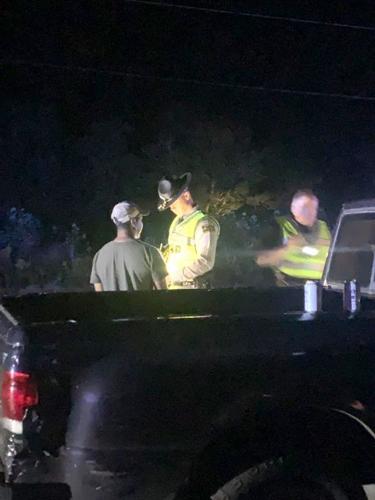
This story was originally published in The Sylva Herald on Sept. 21 2022.
Six years after her husband, Melvin, died in a crash with a drunk driver, Kathryn Barnes of Sylva is still mourning the man who “loved life and having fun with family and friends.” She is also working to prevent other families from suffering the same loss and heartbreak.
Barnes sent an email to The Sylva Herald last week asking for coverage of a DWI checkpoint in honor of her husband.
Last Friday, she was on the scene when law enforcement officials organized a DWI checkpoint near the Tuckasegee Trading Post, 7987 N.C. 107.
Gov. Roy Cooper’s DWI Task Force, the N.C. Highway Patrol and the Jackson County Sheriff’s Office worked together on the operation, she said in her email.
Barnes and his wife, Kathryn, were hit head-on by a drunk driver on the same stretch of road on Nov 30, 2016.
Just after 9 p.m. that night, James Davis Saunders was driving south on N.C. 107 in a 2003 Chevrolet pickup truck, the Barnes were coming home from a church service.
Near Moody Bridge Road, Saunders’ vehicle crossed the center line of the two-lane highway, slamming head-on into the Barnes’ 1997 Dodge pickup truck. Melvin Barnes, 61 at the time, died at Mission Hospital in Asheville the next day.
Saunders recorded a blood-alcohol content of 0.22 percent, nearly three times the 0.08 percent legal limit, and has a criminal past that includes driving while impaired arrests in Jackson County in 1993, 2003 and 2008.
The N.C. Highway Patrol originally charged Saunders with felony death by vehicle, driving while impaired and felony serious injury by vehicle. A Jackson County Grand Jury upgraded the charges to second-degree murder.
Kathryn Barnes suffered a broken arm.
Referring to the impaired driver Kathryn Barnes said, “He was in a three-quarter ton truck doing 70 miles an hour on impact.”
Native son
“Everybody who knew Melvin loved him,” Barnes said.
Melvin Barnes was born and raised in Jackson County, a maintenance supervisor for 21 years until his passing. He worked on all the Jackson County buildings, working construction and electrical according to his wife.
“He knew those buildings inside and out,” Barnes said.
This DWI checkpoint was the first one in honor of Melvin Barnes, but law enforcement performs checks in different locations throughout Jackson County. They are done both during the day and at night.
When the first car rolled up to the checkpoint an officer stopped them, checked their identification, and after some time assessing their behavior sent them on their way. This was the case for most of the cars that were stopped.
Officers working the checkpoint also took the time to remind drivers if they had a broken windshield or to write tickets for late registration.
Still, getting impaired drivers off the road is job one.
Looking for signs
“You’re looking for glassy eyes, slurred speech, poor motor skills, if you ask somebody for their driver’s license, they’re having a hard time handing their driver’s license to you,” JCSO Lt. Blake Watson said while performing the checks.
They also keep an eye out for behavior that would signal the use of drugs other than alcohol. The officers running the checkpoint would not search cars unless they had reason to do so.
“If it’s marijuana of course you have the smell of marijuana,” Watson said. “If you think somebody is on methamphetamine, they’re tweaking, they’re very nervous, very jittery, eyes darting everywhere. It’s very easy to tell.”
There were no narcotics K-9s on the scene.
Drivers suspected of being under the influence are given a portable breath test, then go through a field sobriety test. Officers give the two tests five minutes apart. If the tests give them enough reason to believe someone is impaired, an arrest follows.
At the checkpoint, one person was arrested for driving while under the influence. Two opened cans of Modelo and six unopened cans were found in the vehicle.
“If they’re arrested for driving while impaired, they’re transported to the Jackson County Detention Center,” Watson said. “In jail, an intoxilyzer test is given and the person who was arrested has a 30-minute observation time to call a lawyer or attorney. If they don’t want to call either one, the test can be given in 15 minutes. If you blow .08 or higher you will be charged with driving while impaired.”
Everyone brought to jail for the breath test is charged with DWI, but if the test reveals a BAC less than .08 the charges are often not upheld by the magistrate, according to JCSO Chief Deputy Matt Wike.
This past Friday was impactful for Kathryn Barnes, she said. She hopes this makes a difference.
“If it just takes one person off the road and keeps someone from going through what my family and I have had to go through, then to me it’s worth it,” Barnes said.


